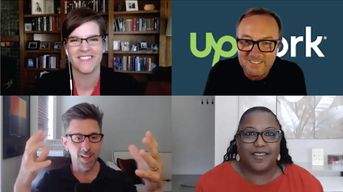Transparency and Trust at Work

Managing emotions in the workplace - with colleagues, customers and vendors - can be difficult in the best of times. We covered a wide range of topics related to emotions at work in our recent webinar, featuring business leaders Robin Miles (VMWare) and Lars Asbjornsen (Upwork). Dr. Marc Brackett, our co-founder and the Director of the Yale Center of Emotional Intelligence, provided science-based insights throughout the discussion. One of the important themes that emerged centered around the importance of transparency and trust amidst uncertainty.
We invite you to check out this excerpt from the webinar as Robin describes what modeling this means for leaders and Lars shares what it looks like in practice:
What are some ways we can do better at fostering transparency and trust?
Model the behavior. It starts with you. As Robin stated, “It really does help when you have your senior level executives in the organization role model transparency and clarity and role model that they don’t know all the answers.” Get comfortable with honest statements like, “We really don’t always know what is going to happen. We’re are waiting to see how things unfold.”
Do you feel your shoulders rise a bit when you think about admitting that you don’t have all the answers? You’re not alone. This isn’t a something we have a lot of practice with because it pushes against our inclination towards certainty. Robin put it best – “we haven’t developed the capacity to be comfortable with the transformation as it is unfolding which is why these anxieties come up.” This modeling is super important and as a leader you’ll give your colleagues permission to feel like they don’t need to have all the answers, either.
In discussing transparency, Lars emphasized the importance of establishing routines. “Establishing an expected communication cadence says to your employees and colleagues: we are doing everything we can to drive transparency even in ever-changing circumstances. Everybody is dealing with this differently but this kind of consistency can help people feel assured that they are receiving information as they need it."
Acknowledging that you don’t know how things will unfold can help to improve trust as you share your vulnerability. None of us have taken a class on “leadership during a pandemic” - we’re learning together. As we think about modeling better behavior, it’s also time to take a more measured approach to consuming COVID content. Initially, many of us were overly immersed in the constant high-intensity news cycles. This news compulsion isn’t great for our well-being. In fact, it makes this marathon even harder on all of us. Now that the initial pandemic shock is over and we adjust to a new normal, Lars Asbjornsen shared a much healthier approach: “be COVID-informed, not COVID-obsessed.”
As part of our commitment to providing our broader community with support during this time, we've developed a Corona Care Toolkit with free resources including e-books, webinars and more. We hope you'll join us and invite anyone who you think may benefit.
*Note: this webinar took place on May 21st, 2020 before the killing of George Floyd on May 25th and the events that followed. We stand in solidarity with the Black Community and are working hard to dive deep on the underlying emotions of injustice. We are not experts in this area but Oji Life Lab is committed to work to dismantle interpersonal and structural racism.
Latest Posts
BACK TO HOME ❯ Developing New Managers? How to Set Them Up for Success
Developing New Managers? How to Set Them Up for Success
 First-time Managers Are Holding Back Employees & Performance
First-time Managers Are Holding Back Employees & Performance
 Why New Managers Fail and How Oji Foundations is Revitalizing Leadership Training
Why New Managers Fail and How Oji Foundations is Revitalizing Leadership Training
Sign up for our People-Powered Newsletter.
